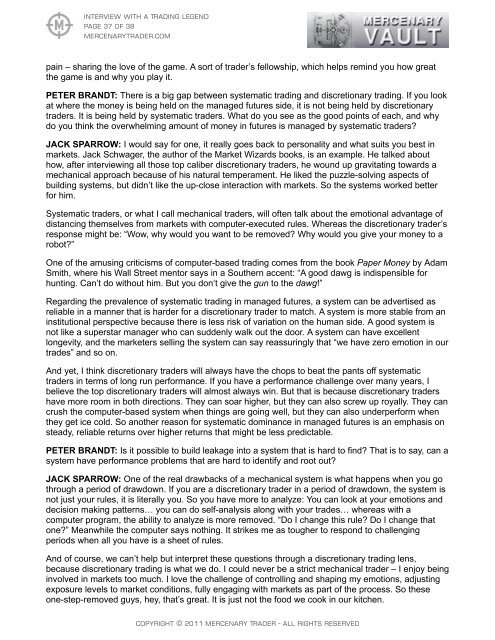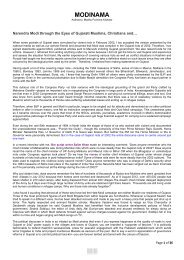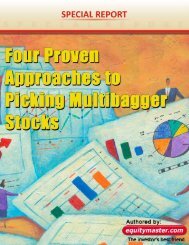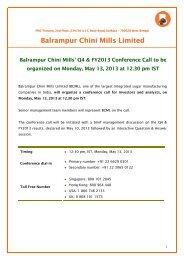Interview With a Trading Legend - Mercenary Trader
Interview With a Trading Legend - Mercenary Trader
Interview With a Trading Legend - Mercenary Trader
You also want an ePaper? Increase the reach of your titles
YUMPU automatically turns print PDFs into web optimized ePapers that Google loves.
<strong>Interview</strong> <strong>With</strong> a <strong>Trading</strong> <strong>Legend</strong><br />
Page 37 of 38<br />
mercenarytrader.com<br />
pain – sharing the love of the game. A sort of trader’s fellowship, which helps remind you how great<br />
the game is and why you play it.<br />
PETER BRANDT: There is a big gap between systematic trading and discretionary trading. If you look<br />
at where the money is being held on the managed futures side, it is not being held by discretionary<br />
traders. It is being held by systematic traders. What do you see as the good points of each, and why<br />
do you think the overwhelming amount of money in futures is managed by systematic traders?<br />
JACK SPARROW: I would say for one, it really goes back to personality and what suits you best in<br />
markets. Jack Schwager, the author of the Market Wizards books, is an example. He talked about<br />
how, after interviewing all those top caliber discretionary traders, he wound up gravitating towards a<br />
mechanical approach because of his natural temperament. He liked the puzzle-solving aspects of<br />
building systems, but didn’t like the up-close interaction with markets. So the systems worked better<br />
for him.<br />
Systematic traders, or what I call mechanical traders, will often talk about the emotional advantage of<br />
distancing themselves from markets with computer-executed rules. Whereas the discretionary trader’s<br />
response might be: “Wow, why would you want to be removed? Why would you give your money to a<br />
robot?”<br />
One of the amusing criticisms of computer-based trading comes from the book Paper Money by Adam<br />
Smith, where his Wall Street mentor says in a Southern accent: “A good dawg is indispensible for<br />
hunting. Can’t do without him. But you don’t give the gun to the dawg!”<br />
Regarding the prevalence of systematic trading in managed futures, a system can be advertised as<br />
reliable in a manner that is harder for a discretionary trader to match. A system is more stable from an<br />
institutional perspective because there is less risk of variation on the human side. A good system is<br />
not like a superstar manager who can suddenly walk out the door. A system can have excellent<br />
longevity, and the marketers selling the system can say reassuringly that “we have zero emotion in our<br />
trades” and so on.<br />
And yet, I think discretionary traders will always have the chops to beat the pants off systematic<br />
traders in terms of long run performance. If you have a performance challenge over many years, I<br />
believe the top discretionary traders will almost always win. But that is because discretionary traders<br />
have more room in both directions. They can soar higher, but they can also screw up royally. They can<br />
crush the computer-based system when things are going well, but they can also underperform when<br />
they get ice cold. So another reason for systematic dominance in managed futures is an emphasis on<br />
steady, reliable returns over higher returns that might be less predictable.<br />
PETER BRANDT: Is it possible to build leakage into a system that is hard to find? That is to say, can a<br />
system have performance problems that are hard to identify and root out?<br />
JACK SPARROW: One of the real drawbacks of a mechanical system is what happens when you go<br />
through a period of drawdown. If you are a discretionary trader in a period of drawdown, the system is<br />
not just your rules, it is literally you. So you have more to analyze: You can look at your emotions and<br />
decision making patterns… you can do self-analysis along with your trades… whereas with a<br />
computer program, the ability to analyze is more removed. “Do I change this rule? Do I change that<br />
one?” Meanwhile the computer says nothing. It strikes me as tougher to respond to challenging<br />
periods when all you have is a sheet of rules.<br />
And of course, we can’t help but interpret these questions through a discretionary trading lens,<br />
because discretionary trading is what we do. I could never be a strict mechanical trader – I enjoy being<br />
involved in markets too much. I love the challenge of controlling and shaping my emotions, adjusting<br />
exposure levels to market conditions, fully engaging with markets as part of the process. So these<br />
one-step-removed guys, hey, that’s great. It is just not the food we cook in our kitchen.<br />
Copyright © 2011 <strong>Mercenary</strong> <strong>Trader</strong> - All Rights Reserved
















